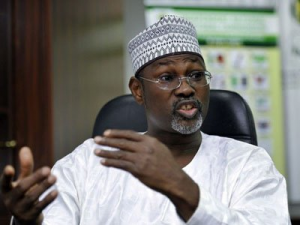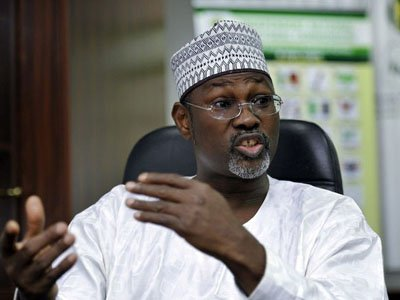Controversy over the reordering of next year’s general elections by the National Assembly was on the front-burner yesterday.
Those opposed to the amendment by the upper and lower chambers should go to court, the former Chairman of the Independent National Electoral Commission (INEC), Prof. Attahiru Jega, counselled yesterday.
Jega urged the Federal Government, INEC and other interested parties to challenge the action in a court of law.
He corrected the notion that the National Assembly fixed a date for the elections; saying that the lawmakers merely reordered the sequence.
According to The Nation, Jega spoke in Abuja at an event organised by the Youth Initiative for Advocacy Growth and Development.
Speaking on the theme: “Is Nigeria’s democracy under threat?” the former INEC chair said it has become imperative for the parties to seek judicial interpretation on the matter.

He said: “Both INEC and the interested parties have been reluctant to go to court for interpretation of constitutional provisions and this is significant because this has to do with the independence of electoral bodies.
“Frankly, a lot of the arguments on this cannot be wished away and I think it is necessary for the independence of the electoral commission because that is key to the integrity of the electoral process because if we allow people to jettison and undermine that independence for whatever reason, then we are in serious problem. I think there is serious justification to test this matter in court.”
He stated that the organisation and scheduling of elections remained INEC’s exclusive preserve.
Jega said: “I am struggling to see where the National Assembly found the constitutional justification for what they have done. I will mention two specific provisions. First of all, in the Schedule of the Constitution, Part 15 Section 1 of the said schedule, INEC has the constitutional power to organise, undertake and supervise elections.
“But that is not enough. In Section 76 (1), Section 111 (1) and Section 178 (1), it is categorically stated that elections shall be held on a date to be appointed by INEC. So, if elections are to be held on a date set by INEC, where does the National Assembly get the power?
“As far as I am concerned, the dates and the sequence for elections are together.”
The former INEC chief however argued that the action of the National Assembly would add to the cost of electoral process as it will now hold on three days instead of two.
Arguing that politicians remained the biggest threat to democracy, he said politicians continued to undermine INEC’s independence, making the commission’s job more difficult.
Also speaking on the alleged underage voting, especially in the last local government election in Kano State, Jega said he was hopeful that the committee set up by INEC to investigate the matter would answer many questions.
He, however, said it was very difficult for the names of underage persons to be removed from the register because Nigeria lacked the technology and database of persons of voting age.
Jega said: “I don’t think there are children on the INEC voter register but it is possible. The range of possibility is very wide. I can tell you that when INEC was finalising the register for the 2015 general elections, there was no software and there is still no electronic device that can distinguish a child from an adult once they are on the register.
“So, the only thing I knew INEC did was to get a team of people to visually go through the register and if you do that, people who are below 12 can be identified visually as children but by the time you get to people who are 15, 16, 17 years old, it is very difficult.
“The margin of error is significant in terms of visual identification of who is of age to be on the register. Also, in the National Assembly, there are people who have baby faces.
“So, using visual method, people who have baby faces run the risk of being removed from the register. So, the challenge is to prevent children from being on the register. Once they get on the register, the possibility of continuing to be there will remain.”
A former Labour Party (LP) Chairman Chief Dan Nwanywanwu, who spoke on the alleged underage voting said any register where underage voters were found should be purged completely while the process of registration be done anew.
Nwanywanwu hailed the National Assembly for changing the sequence of the election.
He, however, stated that the House of Assembly elections should come first instead of the National Assembly poll.


























